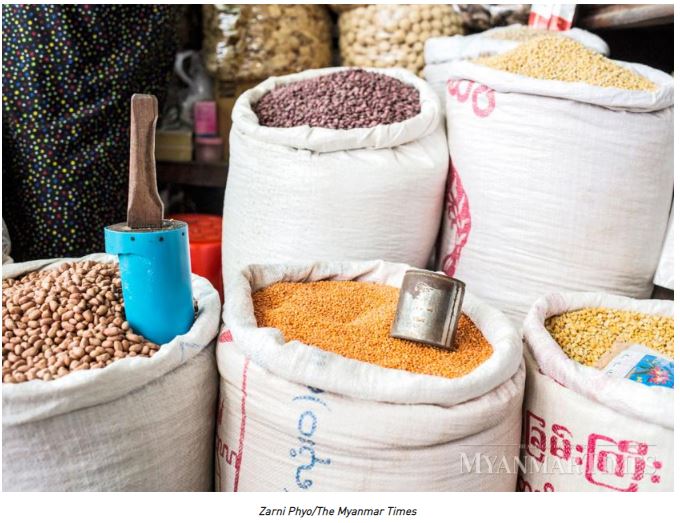Myanmar commodity prices tick up on higher demand
Food prices in Myanmar are on the rise, driven by demand from abroad and other international factors.
Palm oil prices are up by more than 35 percent over the past three months and now fetches more than K2100 per viss (1.63 kilogrammes).
That’s because global prices have been on the rise, driven by demand for palm oil to produce biodiesel, said U San Lwin, secretary of Palm Oil Importers Association.
U Win Tun, a palm oil distributor, said prices have been creeping up even though the US dollar has weakened against the local currency.
Myanmar imports between 30,000 tonnes and 50,000 tonnes of palm oil per month, mainly from Malaysia and Indonesia
Due to rising prices, local demand for edible palm oil has fallen, and the volume of palm oil imported is likely to be reduced in the months ahead. “We only managed to sell 7,000 boxes of bottled palm oil last month compared to 10,000 boxes before,” said Shwe Nyar Thar Edible Oil Distribution Business’s staff. The fall in demand for palm oil could create new markets for other plant-based edible oils such as peanut oil, sesame oil and sunflower oil.
Since 2008, when cheap palm oil flooded the local market, manufacturers of other edible oils were not able to compete at the same price level. But if high prices persist, locals may opt for alternatives.
One viss of sunflower oil costs around K3,200 to produce and oil millers have started making arrangements to grow more sunflowers to meet anticipated demand.
Bean prices pulse higher
The price of local beans and pulses has also risen since India raised the volume of black beans imported from Myanmar from 1.5 million tonnes to 2.5 million tonnes last year.
More recently, demand from other countries like Pakistan has risen as buyers rush to fix import prices before India sets new quotas. Pakistan is now buying 1,500 tonnes of black beans daily. “The other countries are worried that Myanmar’s bean prices will spike once India starts buying again,” said U Min Ko Oo, secretary of the Myanmar Pulses, Beans and Sesame Seeds Merchants Association.
Local prices for black beans are now around K125,000 per tonne, up around 25pc from last year.
According to the Ministry of Agriculture, Livestock and Irrigation, some 77 pc of Myanmar’s annual pulse crop is exported to India. Black beans are usually planted in March and April, and harvested in September or October. The crop is grown largely in Magway, Ayeyarwady, Yangon, Mandalay and Sagaing.
Double the onions
Meanwhile, monsoon onion prices have more than doubled in the local market, but farmers said they aren’t making any profit even though the price is now K180,000 per 100 viss compared to K70,000 last year.
“The production rate of onions has declined. Although we grow as much as we can, the plants fail to survive. During the three-month cultivation period, we have to cost other expenses. So, we are only left with a small amount of profit,” said U Hla Aung, an onion farmer.
The farmers said production rates have declined by almost 40pc this year. “The onion trade is currently low and prices have been reduced due to the long holidays. Old onions have almost run out. New ones have started to come into the market,” said U Khin Han, head of the Onion, Garlic Production and Exporting Association of Myanmar.
The monsoon onion is a type of small onion which is grown in October and harvested in early December.
Source: https://www.mmtimes.com/news/myanmar-commodity-prices-tick-higher-demand.html


 English
English




